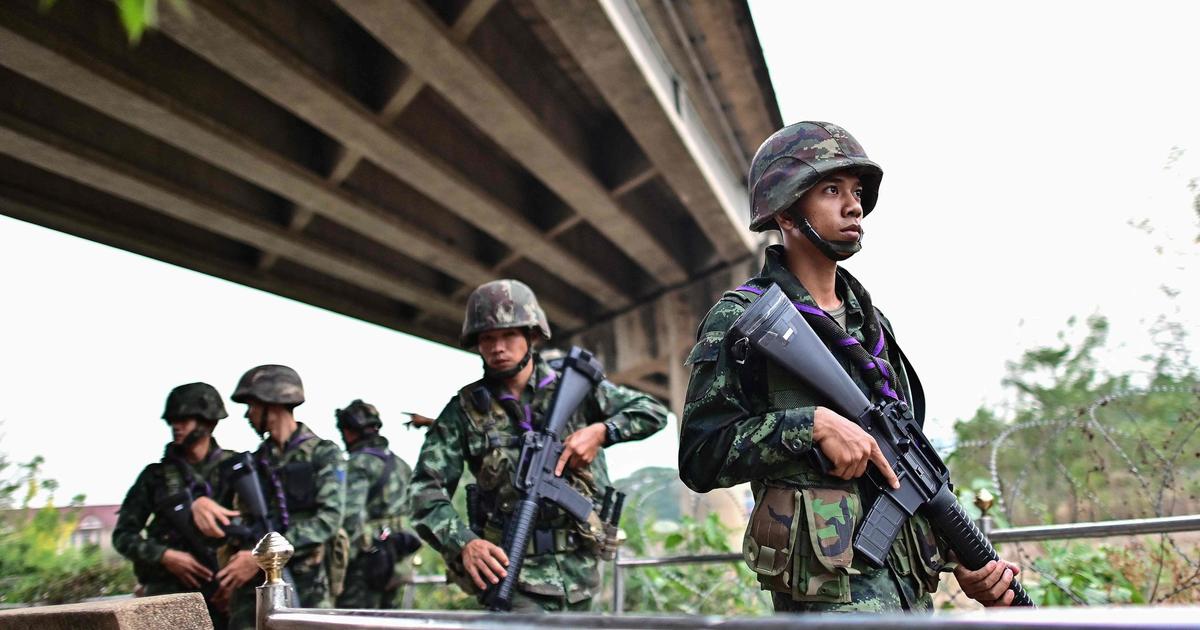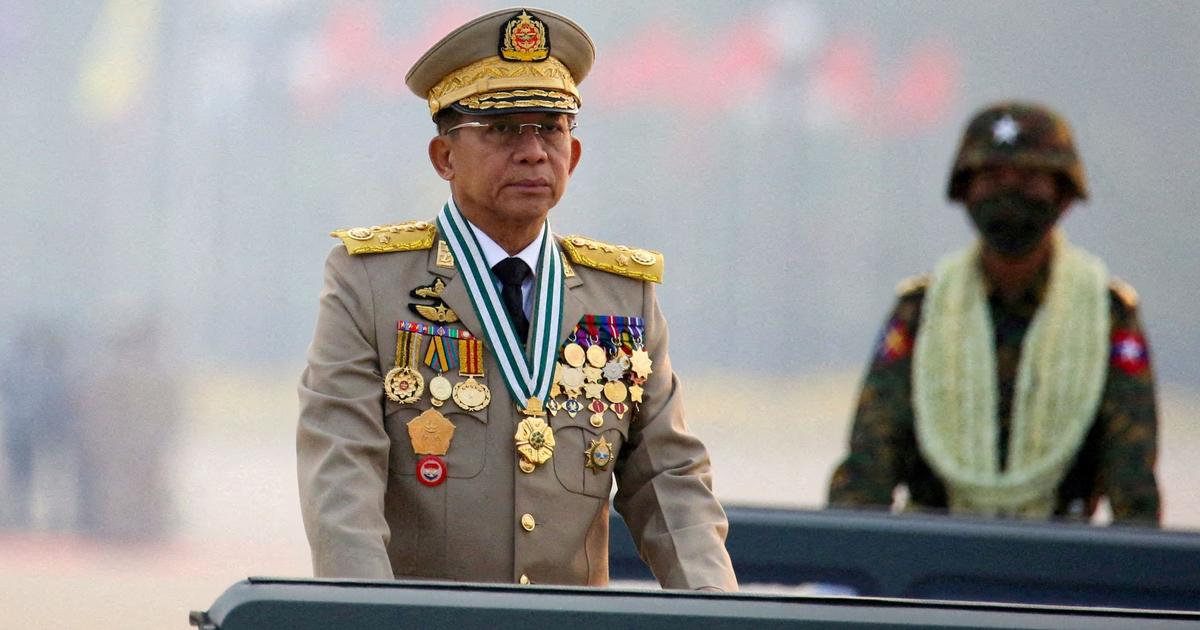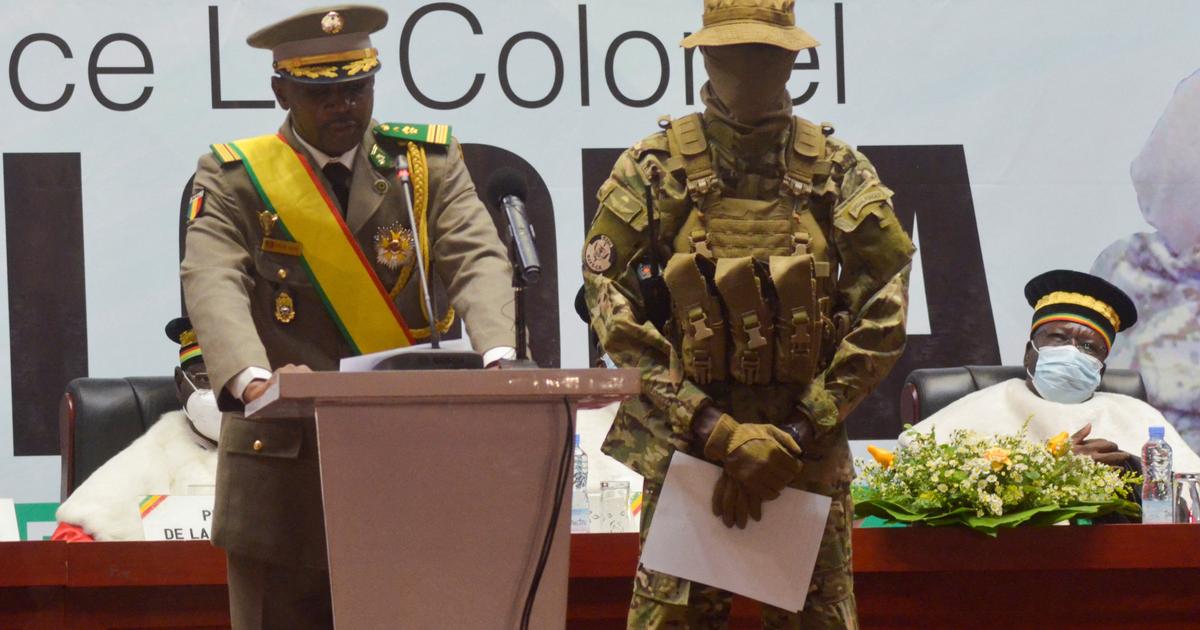Enlarge image
Yangon, Myanmar: Hundreds of demonstrators have been killed and tens of thousands arrested since the military coup
Photo: AP Content / AP
The year 2021 in Myanmar ended as it had started.
With violence.
On Christmas Eve, the military carried out an attack in Kayah state in which more than 30 women, children and men were killed.
They were recovered from burned cars, including two employees of the Save the Children organization.
The new wave of violence in the country began on February 1, 2021, when the military junta came back to power.
Since then she has been brutal against demonstrators, hundreds are now dead, tens of thousands in prison.
For all the cruelty, something has happened in the past few months that Thomas Kean of the International Crisis Group (ICG) finds remarkable.
For a current report by the ICG, which SPIEGEL had received in advance, he examined how the coup in Myanmar had affected the conflicts in the country's ethnic areas.
According to Kean, widespread opposition has formed in the country.
Some armed groups of the ethnic minorities are now working with the democratic opposition, i.e. with the newly formed counter-government, the National Union Government (NUG), which also includes politicians from the ousted government of Aung San Suu Kyi.
You play a vital role in the fight against the junta.
This is also remarkable because in Myanmar there has been a fight for semi-autonomous areas and self-determination rights for decades;
there had been recurring riots between ethnic groups and any government in the past.
SPIEGEL
: Mr. Kean, it was a year ago the coup.
How are the people in Myanmar?
Kean
: The situation is staggering, as if Myanmar has just fallen off a cliff. Poverty is increasing, countless people have been displaced, on the run in their own country. And it doesn't look like all of that will change anytime soon. A great humanitarian emergency. In July, the delta wave swept over Yangon. I was in town then, it was cruel. Hospitals completely overloaded. The vaccination rate is low. Other health care provisions are also canceled, and child vaccinations are no longer given. What if the Omikron variant strikes? The health system has long been down, you can see it everywhere. The life of the people in Myanmar is expected to continue to deteriorate. The only question is: is it going to get a little worse or seriously worse?
SPIEGEL:
Despite everything, the people in the country stand together.
What do they have in common in their resistance?
Kean:
The violence used by the military.
This unspeakable brutality pulls people together.
The democratic opposition is driven by a kind of Grasroot movement, the young people all over the country.
These men and women have had to carry injured or dead friends from the streets.
You have experienced firsthand repression by the military.
From these traumatic experiences feeds, if you will, the conviction to oppose it.
SPIEGEL
: What is the difference between the current uprisings against the military and earlier ones, around 1988?
Kean
: The junta absolutely didn't expect people to fight back like that. She miscalculated. Social media make a crucial difference. In the past, protesters have been completely isolated. If you demonstrated in the streets in Yangon in 1988, you did not know what was happening a few kilometers away. Whether you are alone in your resistance - or whether many across the country stand up and fight back. This time, news spreads instantly when a soldier shoots a protesting woman in the head. The pictures from the demos are everywhere - and they motivate more people. The military tried to control social media but failed.
SPIEGEL
: Now what the military absolutely wanted to prevent has happened: a strong democratic front has formed.
Kean
: Different ethnic groups have - because they have been fighting as minorities against the central government for decades - their own armies, they have their own health systems and supply routes. They play a central role in equipping the Myanmar opposition. With weapons, of course. But also politically and humanitarian. With a Covid vaccine, for example. They train resistance fighters, equip them. Certainly there are also groups that stay out of the way or rather sympathize with the side of the junta. But the alliances between many ethnic armed forces and the democratic opposition are particularly striking. These have become increasingly narrow in the past weeks and months.
SPIEGEL
: How can you be certain that this merger will last?
There has been barely a year of political calm in Myanmar since its independence.
There are more than 20 minority groups.
A splintered country.
Kean
: There will be no united front that includes all armed ethnic groups in Myanmar, the rivalries are too great for that.
But at least four groups are now important partners of the informal counter-government, and another five or six in part.
I feel that the relationship between ethnic minorities and the majority population in the country has changed dramatically as a result of the coup.
They all want the military out of the way.
In the past, the majority in Myanmar viewed the minorities, and in particular the armed ethnic groups, as destructive forces.
They were blamed for Myanmar's underdevelopment and all of its problems.
Now there is a lot of sympathy for the ethnic minorities, this is new.
And that doesn't just happen at the top.
The people respect each other, listen to each other, in the broader population.
Understanding for one another grows.
This is extremely important.
SPIEGEL
: What is the NUG counter-government promising the ethnic groups?
Kean:
To finally rebuild Myanmar into a federal system in which the ethnic groups should have a say and are represented.
The groups have been fighting for such a system for decades.
For them it is a unique opportunity to rebuild Myanmar's political base.
Even if they are not naive: the groups know how long it takes to fight against the junta and want to win.
A cruel, tough fight.
SPIEGEL
: What could and should the international community do?
Kean
: The rest of the world mustn't put their hands on their laps and say: Oh, the situation in Myanmar is too complicated, there is nothing we can do.
But!
We have to find creative ways to help.
For example, better use the border regions to send goods into the country.
These are often the areas of the ethnic groups.
We must not underestimate how well connected they are and how much influence they have.
How much they can do.
This contribution is part of the Global Society project
Expand areaWhat is the Global Society project?
Reporters from
Asia, Africa, Latin America and Europe
report under the title “Global Society” - on injustices in a globalized world, socio-political challenges and sustainable development.
The reports, analyzes, photo series, videos and podcasts appear in a separate section in SPIEGEL's international department.
The project is long-term and is supported by the Bill & Melinda Gates Foundation (BMGF).
A detailed FAQ with questions and answers about the project can be found here.
AreaWhat does the funding look like in concrete terms?
The Bill & Melinda Gates Foundation (BMGF) has been supporting the project since 2019 for an initial three years with a total of around 2.3 million euros - around 760,000 euros per year.
In 2021, the project was extended by almost three and a half years until spring 2025 on the same terms.
Are the journalistic content independent of the foundation?
Yes.
The editorial content is created without the influence of the Gates Foundation.
Do other media have similar projects?
Yes.
Major European media outlets such as "The Guardian" and "El País" have set up similar sections on their news sites with "Global Development" and "Planeta Futuro" with the support of the Gates Foundation.
Have there already been similar projects at SPIEGEL?
In the past few years, SPIEGEL has already implemented two projects with the European Journalism Center (EJC) and the support of the Bill & Melinda Gates Foundation: the “Expedition ÜberMorgen” on global sustainability goals and the journalistic refugee project “The New Arrivals” within the framework several award-winning multimedia reports on the topics of migration and flight have been produced.
Where can I find all publications on global society?
The pieces can be found at SPIEGEL on the topic Global Society.



/cloudfront-eu-central-1.images.arcpublishing.com/prisa/KEJKPQHVMJAPJONPEDK42JL56U.jpg)





